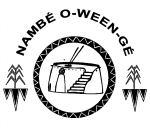From the Nambe Pueblo Domestic Violence Program- Healthy Family Services
October is National Domestic Violence Awareness, Substance Abuse Awareness & Breast Cancer Awareness Month
There is an ongoing epidemic of violence particularly against Native women in the United States. Native American women are two and a half times more likely to be subjected to domestic violence than any other group of women. 1 in 3 Native women will be raped in her lifetime and 3 in 5 will be physically assaulted. On some reservations, Native women are murdered at rates 10 times the national average.
Domestic Violence is not:
*genetically inherited
*caused by illness
* caused by alcohol or drugs
* the result of stress or anger
* due to “a bad temper
* due to the behavior of the victim, children or a problem in the relationship
Domestic Violence is: “Intimate Partner Relationships of all Genders”
- a pattern of behavior where one partner seeks to gain or maintain power and control over the other
- a learned behavior
- offenders learn from observations of other people, including family and friends
- the purpose of the behavior is to frighten, intimidate, terrorize, manipulate, hurt, humiliate, blame, injure or wound someone
Physical abuse: This includes acts in which physical force is used to coerce the victim. This might include pushing, shoving, or being held against their will; slapped, kicked, bit, strangled or punched. There may be threats or use of weapons and rape.
Sexual Abuse: Sexual abuse is most often thought of as rape or forced sexual actions. It can also include forced undressing or watching of sexual acts. Forced sex when in danger, sick or after a beating, are also forms of sexual abuse. Sexual abuse might also include demeaning jokes or name-calling (frigid, whore) intended to degrade the victim. A victim might be treated as a sexual object and be made to dress in a sexual manner with which victim is not comfortable. There may be jealous accusations regarding sex or the abuser may minimize their partner’s feelings about sex.
Emotional/ Mental Abuse: In emotional or mental abuse the victim’s feelings may be ignored and minimized while excessive attention is demanded to the abusers needs. They may ridicule the victim or gender as a group with the intent to degrade them. They may also ridicule their beliefs, values, religion, class, heritage or race. As punishment, there may be withholding of approval or name calling. They may isolate victim by driving away friends and /or family. They may be kept from working or be forced to work. They may demand complete control of money and refuse to share the workload. They may threaten to take the children or abuse their pets. Manipulation with lies and contradictions is abusive behavior, as are threats of violence, suicide, and homicide.
For far too long, domestic violence was ignored or treated as a private matter where victims were left to suffer in silence without hope of intervention. During National Domestic Violence Awareness Month, we at Nambe Pueblo Domestic Violence Program stand with all those who have been affected by this terrible crime and commit to putting an end to domestic violence.
For more information please click the link below:
Nambe Pueblo Healthy Family Services
Nambe Pueblo Healthy Family Services (NPHFS)
Our Mission is to promote the wellness of individuals and community by providing quality cultural services through adaptable measures to increase safety, awareness, accountability, and healthy families.
Our Vision is living the spirit of sacredness through the integration of core values and integrity.
Our Values Are:
Respect- To honor others and treat all individuals with dignity.
Trust & Confidentiality- All relationships will be established based on trust, confidentiality, and integrity. Services will be provided in a non-judgmental atmosphere incorporating availability and reliability.
Safety & Support- All services will be comprehensive and provided in a safe atmosphere.
Compassion- All services will be provided in a compassionate and supportive manner to achieve wellness.
Wisdom- The sharing of life experiences, knowledge and self-discipline.
“If you believe you are a victim of domestic violence or a victim of other crimes please don’t hesitate to contact the Nambe Pueblo Healthy Family Services for further information.”
NPHFS Staff is located at 5A & 5B Ekwela Hakanin Poe, in the Blue Buildings across from Nambe Pueblo Courts.
|
Rod Kaskalla, Domestic Violence Prevention Coordinator Email: rkaskalla@nambepueblo.org
|
Office: (505) 455-5593 (x293)
Cell: (505) 423-2387 Fax: (505) 455-0135 |
| Adrian Miranda, Community Care Coordinator
Email: amiranda@nambepueblo.org |
Office: (505) 455-5595 (x295)
Cell: (505) 470-7855 |
| Dusty Naranjo, Children’s/Family Therapist
Email: dnaranjo@nambepueblo.org |
Office: (505) 455-5596 (x302)
Cell: (505) 225-0327 |
| Sashiel Pina, Victim Services Coordinator
Email: spina@nambepueblo.org |
Office: (505) 455-5601 (x301)
Cell: (505) 716-5317 |
| Kelia Yanito, Victim/Legal Advocate
Email: kyanito@nambepueblo.org |
Office: (505) 455-5589 (x303) Cell: (505) 932-8335 |

